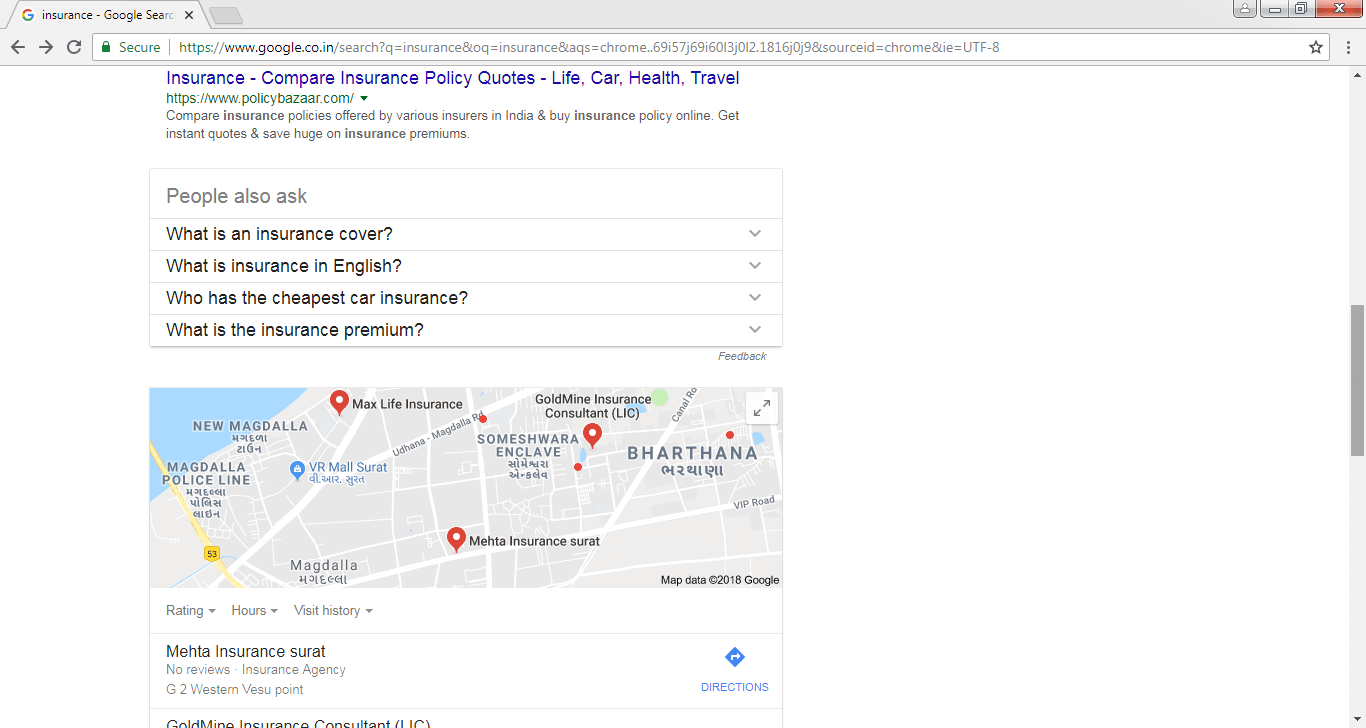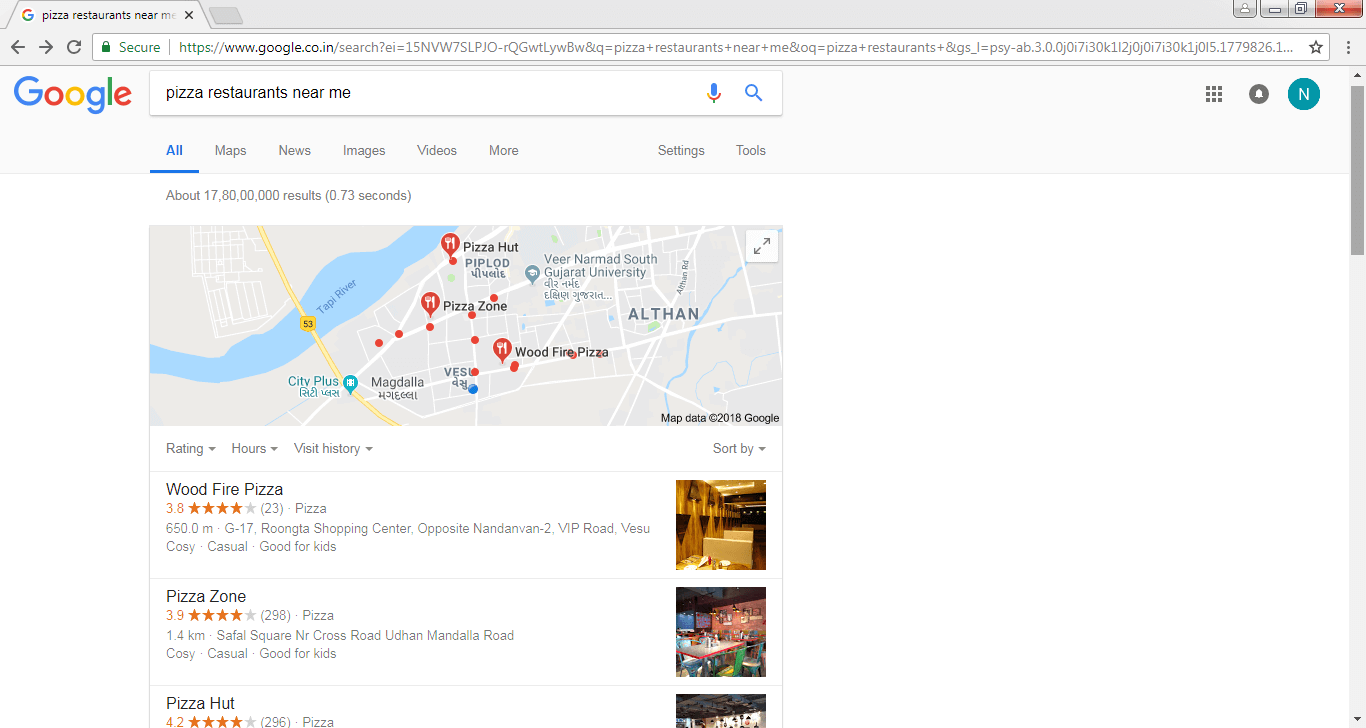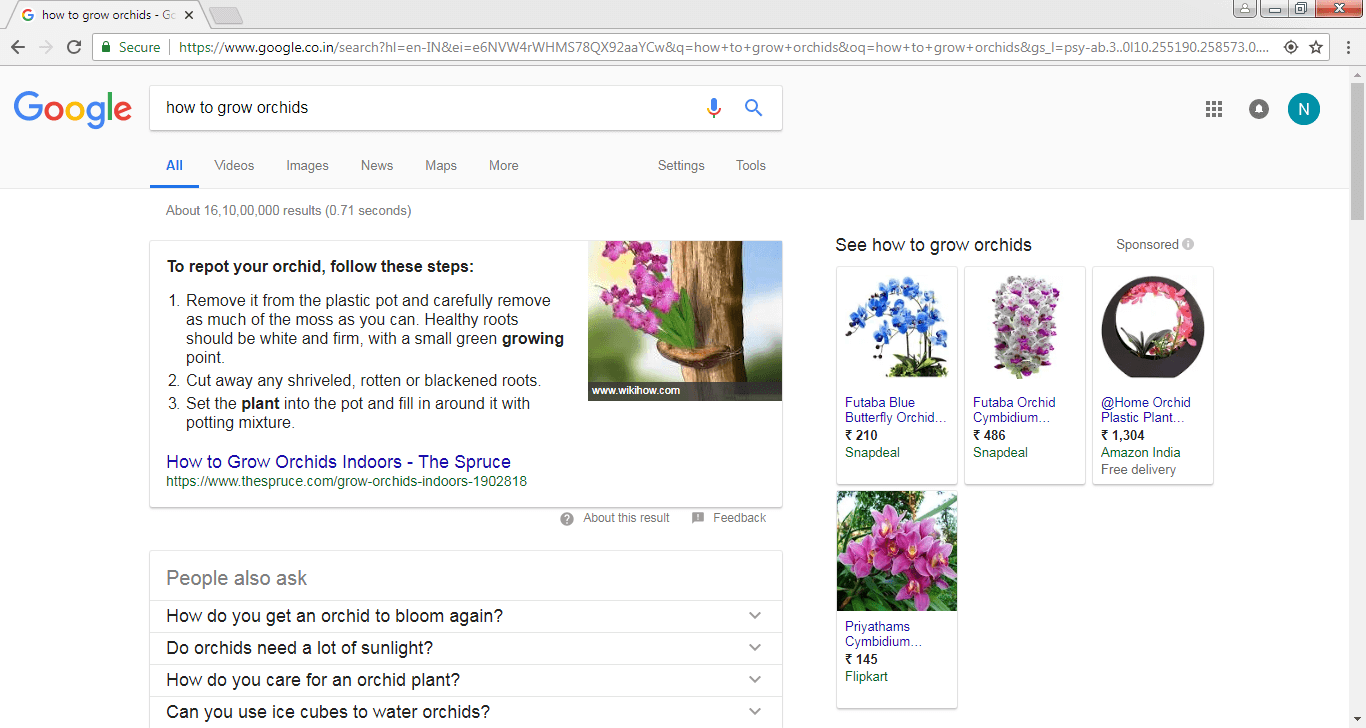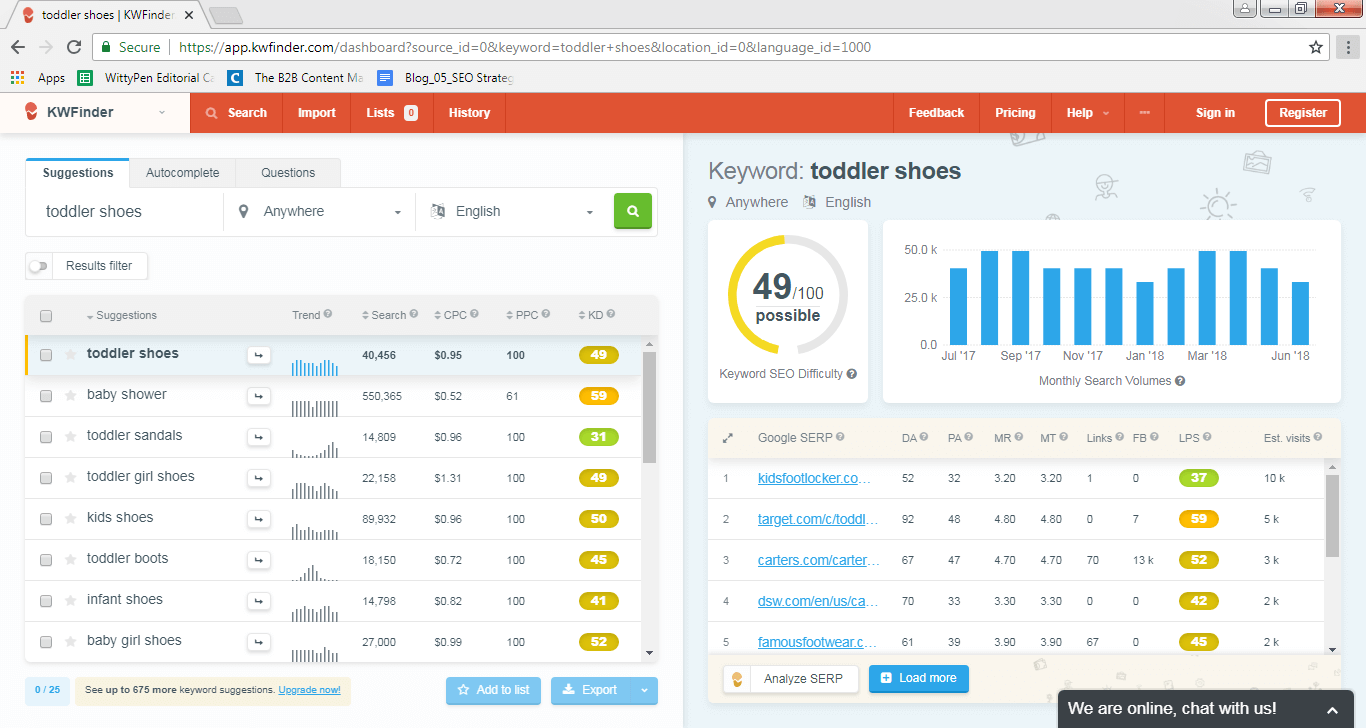Last updated on July 11th, 2023
Google’s search engine algorithm has undergone a sea change and today, Google is smarter than ever before. It is able to perform intuitive searches and most of the time you get the answers instantly in the SERPs itself.
With the emphasis on content marketing increasing every day, winning keyword research and analysis for your brand in 2020 will eventually define your success in getting organic traffic.
Whether you are looking for the phone number of a restaurant you want to dine in tonight or the latest conversion rate of dollar to rupee, you get them all immediately in the search result pages itself.
Well, how does this happen?
Google is now equipped with the Latent Semantic Indexing (LSI) ability that makes it able to correlate semantically related search terms that are latent in a chunk of text.
But here’s the thing, how these algorithm changes will impact your keyword research and analysis?
Well, that’s precisely the answer you will get during the course of this blog.
The fundamentals remain the same.
The idea behind SEO continues to be what it has always been. It is imperative to figure out what keywords you must use when you optimize your website and its content.
Not all key phrases are competitive. The shorter the keyword, the better is chance of a mind-boggling number of indexed pages showing up on Google, and hence it is more difficult to rank on these keywords.
The idea is to look for better niche terms!
Medium-tail phrases of two or three words help in narrowing down the competition but their search volumes tend to be on the higher side.
Long tail keywords bring down the competition even further but their search volumes tend to be low.
The situation with keyword/keyphrase length may not be the same always. There may be times when a single-word keyword ranks high and the long-tail one faces immense competition.
To deal with such diverse situations, keyword research continues to be important. There is no formula behind it and a trial-and-error approach is usually best to follow before you arrive at a workable strategy.
What is Keyword Research and Analysis for SEO and Why is it Important?
In this section, I will be taking you through the what’s and the why’s of keyword research while the hows will follow in the later part of the blog. If you are already familiar with these fundamentals (your SEO marketing experience talks!), feel free to move to how you can perform SEO-focused keyword research for your website.
Keyword research is integral to the SEO strategy of any website. Today, as we are in 2023, keyword research and analysis are about finding the user’s intent.
In simple terms, keyword research is about finding words or phrases that have high value and low competition when it comes to acquiring a higher rank in the SERPs.
It’s not always as simple as it looks at the surface level. You need to delve deeper into the psyche of your users to understand what they might be thinking when they search online.
Even when you end up arriving at high-value and low-competition keywords, there’s a need to figure out if you will be able to rank for them.
Keyword analysis is important because you need to know the words or phrases for which your website must rank on Google or other search engines. Unless you know these important keywords or key phrases, your pages cannot really be optimized well enough to get the desired results.
When your keywords are wrong or irrelevant, your pages will not hold user interest and the bounce rate will be high. Right keywords can drive targeted traffic to your business and boost the chances of converting visitors into buyers.
New Trends in Keyword Research
The fundamentals remain the same. Keywords continue to be pivotal to optimizing a website and improving its visibility.
The tweaks in keyword research can be attributed to updates in Google’s algorithm from time to time .
Let’s take a look at what’s trending currently in keyword research.
- Long tail keywords or phrases have gained visibility owing to long query searches by users.
- Google has made display changes to its SERPs in tune with the long-tail queries.
- Google is now able to intuitively display question-related search results and trending news for even one-word queries, an instance of which you will see in a series of screenshots below. The keyword I have chosen is ‘insurance’ and all the screenshots are of the same search page.
Screenshot 1 – Results pertain to what insurance means
Screenshot 2 – Top News Stories on Insurance
Screenshot 3 – People also ask and details of local service providers
- There is increasing use of search engines on mobile devices and more instances of location-related queries. More and more people search on the move for queries like “dentist in my area”, “Chinese restaurant near me” or “ayurvedic medicine stores near the railway station”. Ensure your keyword research is tuned to local and hyperlocal phrases.
Screenshot 4 – Running a Locality-based Search
- Fragmenting SERPs tend to be more intuitive than ever before. Google now uses images in the search results and information boxes to answer queries in the SERPs itself. Using the right keywords can improve your visibility even if it means your optimized images showing up in searches.
Screenshot 5 – Optimised Images are an essential component of SERPs
The Concept of the Keyword Cluster Model
The keyword cluster model is essentially an algorithm that connects the user’s past searches with related topics and phrases to help them find the best search results. It is an excellent SEO tool that allows you to group keywords, and gain traction in search engines to get the desired number of visitors to your website.
The model allows you to target multiple keywords per page, creating additional opportunities for your content to be found online effortlessly.
The two main components of the Keyword Cluster Model include the following-
Pillar Content
Pillar content is the core of the cluster since this is based on the broader topic. It is usually best for people who are not familiar with a certain topic but want to see a comprehensive overview of it. The pillar content is extensive, covering various aspects of a specific topic.
Cluster Content
Unlike the pillar content that deals with a broad topic, the cluster content usually focuses on a specific keyword that is related to the broad keyword and discusses the same in a more thorough and comprehensive manner. It also contains a link that brings users back to the pillar content.

In simple terms, pillar content is usually focused on a broad keyword with a high search volume, whereas cluster content is focused on more specific keywords with smaller and attainable search volumes.
The SEO objective of the keyword cluster model is simply to gain search engine traffic for highly focused keywords and phrases with smaller search volumes. In an ideal scenario – the better ranking a website can get for cluster content, the more credibility it builds up with Google for its pillar content.
Methods to Identify the Keywords for the Cluster Model
Here is how you can put keyword clustering into practice-
• Collect keywords
One of the methods of using this SEO technique is classic keyword research based on your audience, website, and industry.
• Do thorough competitor analysis and market research
Start with a wide set of keywords from which you can quickly eliminate irrelevant entries to start from a limited data set.
• Use free or paid keyword grouping tools
There are a number of free as well as paid keyword grouping tools that make it easy to identify keyword clusters. Google Search Console is one such free service from Google that lets you understand different types of information about your website, and its visitors.
You can the search Console data to find out different aspects of the website to successfully cluster keywords for better website performance. Along with this information is – how many people are visiting your site, which pages of the website are the most popular, and what percentage of people are visiting the website on desktop or mobile devices.
To Sum It Up
The keyword cluster model is an excellent way to organize the website content that helps both users and search engines to navigate the website content easily.
To gain the most out of this SEO strategy, it is important to choose a strong topic and create pillar and cluster pages methodically, along with the addition of internal links to connect each page.
How to do SEO-focused Keyword Research and Analysis?
We have already discussed what keyword analysis is and we know that sound keyword research can be the most impactful traffic-driving action. Here’s how we can conduct advanced keyword research and analysis.
Topic Ideation > Keyword Discovery > Keyword Evaluation
The above depiction throws light on the basic process of keyword research and competitor analysis. Each of the three steps involves figuring out answers to some essential questions in a chronological manner.
- What is the idea behind your content?
- What words do you think people would use to look for your content?
- Which of the several keyword choices you have would be the best one to target?
Figure out the answers to these questions with the methodology given below.
1. Arriving at Your Core Topic
First and foremost, you need to know the content you are looking to optimize with the right keywords. Engage in research or a brainstorming session with your team to arrive at content that is relevant to your domain. Steer clear of irrelevant posts on your website if you don’t want to shove away visitors by giving them something that’s a total cross from what they thought of your nature of business.
2. Choosing a Keyword for Your Content
Now, that you are all set with the topic you will be adding a post on, it’s time to get started with keyword research. There are many tools out there to aid you. Some of these smart ones will give you deeper insights to tell you how popular it is across searchers worldwide.
Here’s a look at the parameters you must consider when evaluating keywords:
a. Search Volume
“How many people are looking for this keyword on a monthly average?”
High-volume keywords could well be an obvious choice of targeting with your content. However, keep in mind that you must not force keywords into your keyword strategy only with the intention of ranking for a high-volume search.
The content on your page should be consistent with the search intent of the search engine user. Only then will you be able to rank for a particular keyword or drive targeted traffic to your website.
During the course of your keyword research, you may find some keywords that are consistent with the subject matter of your content. Before you are prompted to select the ones with the highest search volume, you need to also check other factors to understand if that particular keyword works well for your content.
b. Competition
“How competitive is this keyword that seems totally apt for my content?”
“Will it help my page rank high or will it be competing against several big websites or paid advertisements in the search engine result pages?”
If a keyword faces very high competition, it may actually be out of bounds for you. Test it out yourself by typing that keyword on the search engine to know what the results look like. This will give you a fair idea if your content has any chance of ranking for this keyword even at a later time. A close look at the SERP is great for gaining insights into how your page might fare with the high-competing, target keyword.
Your page will not just be competing with others in your genre but also with other aspects of the SERPs to get to the top of the rankings. If a lot of paid ads show up for a keyword you search or if there are websites with immense authority for the same content, trust me, you will be facing a lot of competition.
Further, even if your page manages to break through to the first page of the search results, the SERP may have shopping results, paid ads, answer boxes, and People also ask sections before the searcher can see your listing. This means the searcher has to scroll down quite a lot before he can get a peek at your page.
c. Search Intent
“What is a search engine user looking for when he types a keyword into Google?”
“Is the content on my page in tune with the searcher’s intent? Does my page have valuable information to retain his interest?”
Here’s the deal:
If you are using a keyword on your page, you have to pay heed to the searcher’s intent and serve him what he expects. Tons of people may be looking for the same information if they are putting a keyword in the search bar. You can’t have them bounce off your page by making them think you are merely targeting a keyword for SEO leverage without providing anything of value to them.
So, what are you waiting for?
Put your detective hat on and get started with your study. Take a close look at the search results to know what kind of content shows up for a keyword and what is making them rank high.
Are these pages loaded with user-friendly information? Are they how-to articles or instructional pieces of content? There’s so much to decipher from the SERPs.
Another good idea is to get creative with keyword research. Come up with a list of keywords with lesser search volume and less competition. Figure keywords your competition isn’t ranking for but you have a good chance of targeting with your content.
Do not arrive at your important keywords in haste if you want to climb up the rankings on Google. A little procrastination could well work in your favor sometimes!
3. Letting Buyer’s Journey Aid Your Keyword Evaluation
Certain specific kinds of keyword structures indicate where a user/searcher is in the buyer’s journey. If a keyword begins with “how to”, it is an indication that the searcher is at an early stage and is only looking for more information on your product or service. He may not be ready to make a purchase just yet.
If a searcher queries something like “best air conditioner with inverter technology”, he is in the mid-phase of the buyer’s journey when he is weighing the options he has of a product before buying.
Consider the stage a buyer is in and if your content aligns with the same. Keep this in mind when choosing your keywords. If you are writing informative content to educate the visitor, it’s a good idea to use early-stage keywords.
Best Keyword Research Tools for SEO
Take a look at these keyword research tools that are immensely popular with SEO experts.
1. Google Keyword Planner Tool
Yes, this is among the most popular keyword research tools and the best part is that it’s available free of charge to you. Keyword Planner is integrated to Google AdWords and provides deep insights on how a keyword fares on the most popular search engine, Google. Use it as a basic tool for analyzing your keywords.
2. Ahrefs Keyword Explorer Tool
Ahrefs is one tool that provides you with a detailed keyword analysis. It uses clickstream data to show how many clicks you will receive from the search engine.
This happens to be useful since there are countless keywords that have heavy traffic but do not get clicks from the search engine, like in cases when a user gets the answers in the SERP itself without having to click the pages.
Ahrefs offers a 7-day trial for $7.
3. SEMRush
Probably one of the easiest-to-use keyword research tools, SEMRush allows you to do much more than just research your keywords. Add your URL or your competitor’s URL to arrive at all keywords targeted for that page. This way you can figure out your short and long-tail keywords.
Further, you can also get inputs on traffic stats, search engine reports, and other details for running your SEO campaign. You can buy a subscription for $99 to get started with using the tool.
4. KWFinder
KWFinder has gained popularity in recent times and is a relatively new tool that’s totally about researching keywords.
Turn to this tool when you are on the quest for keywords that have the potential of driving targeted traffic to your website. This tool offers both free and paid plans.
Use the free version to get a feel of its usefulness.
5. Long TailPro
This is a paid, cloud-based tool for keyword research. It can help you arrive at a fantastic set of keyword suggestions for your niche or micro-niche sites.
Use their competition checker feature to simplify your job of picking the right keyword.
6. Moz Keyword Explorer
Moz is among the leading SEO tools online and it helps in simplifying the data. The tool demonstrates how tough the competition is for a chosen keyword.
7. Ubersuggest 2.0
Ubersuggest 2.0 is the latest version of Neil Patel’s keyword research and analysis tool. Divided into three sections, Ubersuggest is an easy-to-use tool to make your content more readable and SEO friendly.
Apart from offering a complete overview of the search volume of a keyword for a particular time, it also provides keyword suggestions compiled using Google suggest and Adwords. The third section, SERP analysis, brings up the 100 top-ranking websites for a particular keyword.
8. SpyFu
SpyFu aids SEO efforts and is useful when you are trying to analyze your keywords to stay ahead of the competition in a highly competitive niche.
This platform features compare websites module, keyword history module, domain history module, and related keywords module.
It helps you discover untapped and emerging markets and understand your competitor’s SEO strategy.
The basic plans cost $79 and $99 per month, which you can avail yourself of at a discounted price if you purchase a full year’s plan.
Read More: B2B Content Marketing Strategy: Step-By-Step Guide
Closing Lines
Keep in mind that keyword research is a vital part of any SEO strategy and needs to be addressed in a proper way. Focusing on keywords with lower competition is a good idea.
For your SEO strategy to get sailing, keywords work like a compass and lend direction to your SEO campaign. They indicate whether you are going the right way and if you are making fair progress.
Marketers, it’s time to get started with turning your niche topics into keywords by learning to use your favored keyword research tool effectively.
If all goes well, it’s just a matter of time and perseverance before you see success.
















